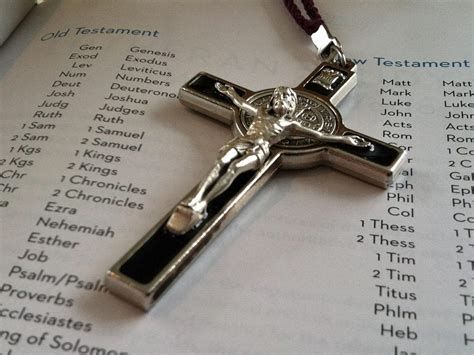The Ten Commandments
The Ten Commandments: The Decalogue
God helps us in many different ways to live a moral life. He gives us grace, which awakens in us the desire to say no to temptation and sin and to choose only that which is good. God gives us help and grace through the Church and through our reception of the Sacraments. He gives us grace to practice human virtues so that we can grow stronger in them. He also teaches us how we should live. One way he does this is by giving us laws to guide our actions.
The Law of Moses, also called the Old Law, was the first stage of
God's Revelation
to us about how to live as people made in God's image. The Old Law is summarized in the Ten Commandments that God had revealed to Moses on Mount Sinai (see Exodus 20: 1-17). The ten laws are also referred to as the Decalogue. The Ten Commandments are a special expression of natural law, making perfectly clear through God's Revelation what he had already placed in the human heart.
Heeding the guidance God gives us in the Commandments will help us know how to serve God and how we should live with each other . It also helps us to open to the grace of the Holy Spirit and what God can accomplish in us and through us by that grace.
- United States Catholic Cathecism for Adults
The First Commandment: Believe in the True God
"I am the Lord your God...You shall not have other gods besides me."
Exodus 20: 2-3
The First Commandment calls us to have faith in the true God, to hope in him, and to love him fully with mind, heart, and will. We respond to God, who has created and redeemed us and extends his provindential care to us every minute of each day. The First Commandment fosters the virtue of religion that moves us to adore God alone because he alone is holy and worthy of our praise.
The Second Commandment: Reverence God's Name
"You shall not invoke the name of the Lord, your God, in vain."
Exodus 20: 7
The Second Commandment calls us to the virtue of reverence for God, which trains us to know and to preserve the difference between the Creator and the creature. Respect for God's name keeps us from reducing him to a mere fact, or even a thing that we can control or manipulate.
At the same time, a gracious God desires to be intimate with us, even becoming incarnate in Jesus Christ and dwelling in us through the Holy Spirit. In John's Gospel, Jesus applies to himself the expression "I Am" (John 8: 58), thus identifying himself with God. He distinguishes himself from his Father and from the Holy Spirit, whom he will send to the world after his Resurrection. This was one way Jesus opened us to understanding God as Trinity.
The Third Commandment: Love the Lord's Day
"Remember the sabbath day, keep it holy."
Exodus 20: 8
Exodus 20: 8-11 states that the Sabbath was the seventh day on which the Lord rested after the work of the previous six days.
Deuteronomy 5: 12 adds that the Sabbath is a day of our renewing covenant with God. The Sabbath is connected to creation and covenant.
The Third Commandment calls us to keep holy the Sabbath day. For Christians, the observance of the Sabbath is transferred to Sunday, the day Jesus rose from the dead. God, through the Church, obliges us to make Sunday holy by participation in the Eucharist and by being prayerfully reflective as possible. Sunday observance fulfills the interior law inscribed in the human heart to render to God visible and public worship as a sign of radical dependence upon God and as gratitude for all the blessings we have received.
Fourth Commandment: Strengthen Your Family
"Honor your father and your mother, that you may have a long life in the land the Lord your God has
given you."
Exodus 20: 12
The Fourth Commandment deals with all aspects of family life; parental and filial duties and resposibilities, that is, those of love from child or parent. This includes the duties of children toward their parents, the duties of brothers and sisters toward each other and the responsibilities of adult children toward their older parents.
The Catholic family forms an environment within which faith is professed and witnessed. When family members pray together, engage in lifelong learning, forgive one another, serve each other, welcome others, affirm and celebrate life, and bring justice and mercy to the community, they help each other live the faith and grow in faith.
The Fifth Commandment: Promote the Culture of Life
"You shall not kill."
Exodus 20: 13
The Fifth Commandment calls us to foster the physical, spiritual, emotional and social well-being of self and others. For that reason, it forbids murder, abortion, euthanasia, and any life-threatening acts. We are called to create the culture of life and work against the culture of death.
The Sixth Commandment: Marital Infidelity
"You shall not commit adultery."
Exodus 20: 14
The Sixth Commandment summons spouses to practice permanent and exclusive fidelity to one another. Emotional and sexual fidelity are essential to the commitment made in the marriage covenant. God established marriage as a reflection of his fidelity to us. The vows made by the spouses at their wedding to be faithful to one another forever should witness the very covenant God has made with us.
The Seventh Commandment: Do Not Steal, Act Justly
"You shall not steal."
Exodus 20: 15
The Seventh Commandment forbids stealing or theft, which involves taking someone's money or property against the will of the owner. Theft includes not only robbery but also actions such as embezzlement, computer theft counterfeit money, fraud, identity theft, copyright violations. We should not steal from each other, pay unfair salaries, cheat in business, or exploit people's weaknesses to make money. Promises should be kept and contracts honored to the extent that the issues are morally just.
To keep this Commandment, we need to acquire the virtues of moderation in our possessions, justice in our treatment of others, respect for their human dignity, and the solidarity with all peoples. Moderation curbs our attachment to worldly goods and restrains our appetite for consumerism. Justice helps us respect our neighbor's rights and be interested in their human well-being. Solidarity opens our hearts to identifying with the whole human family, reminding us of our common humanity.
The Eighth Commandment: Tell the Truth
You shall not bear false witness against your neighbor."
Exodus 20: 16
The Bible teaches that God is the source of truth. Jesus not only taught the truth; he also said, "I am the truth" (John 14: 6). The Hebrew word for truth, emeth, refers both to truth in words and truthfulness in deeds. Jesus both personalized truth and spoke nothing but the truth.
People sin against the truth when they are guilty of ruining the reputation of another by telling lies, when they practice rash judgement, or when they engage in detraction (the unjust telling of someone's faults), perjury (lying under oath), or calumny (telling lies about another).
Scripture is clear about the evil of lying. In the Sermon on the Mount, Jesus said, "Let your 'Yes' mean 'Yes' and your 'No' mean 'No'. Anything more is from the evil one." (Matthew 5: 37). This reminds us not only that we need to be truthful, but also that hypocrisy, saying one thing while doing the opposite, is a sin against truth.
The Ninth Commandment: Practice Purity of Heart
"You shall not covet your neighbor's wife."
Exodus 20: 17
We experience tensions between spiritual and physical desires. This struggle belongs to the heritage of sin. This does not mean that we are to despise the body and emotions that, with the soul, constitute our nature. It does make us realize that we will face a daily spiritual struggle to acquire virtues that help us obey the saving action of the Holy Spirit and overcome vices that cause us to resist him.
The grace of Baptism purifies us from sins, but a certain tendency to sin remains. We must struggle against disordered desires by practicing purity of mind, heart, and body with daily vigilance. To do this, we need to examine our motives as well as our deeds, so that we always seek God's will. This will cause us to discipline our feelings and imagination.
The Tenth Commandment: Embrace Poverty of Spirit
"You shall not covet your neighbor's house...or anything that belongs to your neighbor."
Exodus 20: 17
When Jesus began the Sermon on the Mount (Matthew 5: 1-12), he proclaimed the eight Beatitudes as the ways to authentic happiness. The first of these stated that poverty of spirit would enable us to inherit the Kingdom of God. In other words, the first step on the road to joy begins with a healthy detachemnt from material goods. Later on in the sermon, Jesus taught that building up wealthfor its own sake is foolishness. We should be more interested in spritual riches.
The financial scandals that periodically occur in our culture remind us that greed is a constant threat to moral behavior. It leads many to conclude that money is the root of all evils. But in fact, "the love of money is the root of all evils" (1 Timothy 6: 10). In the study of the Seventh Commandment, we dealt with the visible acts of stealing and injustice. The Tenth Commandment looks at the interior attitudes of greed and envy that lead us to steal and act unjustly.
On the positive side, the Tenth Commandment calls us to practice poverty of spririt and generousity of heart. These virtues liberate us from being slaves to money and possessions. They enable us to have a preferential love for the poor and to be witnesses of justice and peace in the world. They also enable us to adopt a simplicity of life that frees us from consumerism and helps us preserve God's creation.
God's Self Revelation
Revelation is the self-disclosure of the living God and his plan to save us. Revelation shows us that God desires to have an intimate and loving relationship with everyone.








